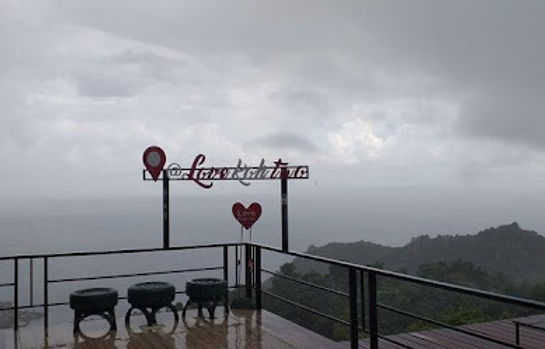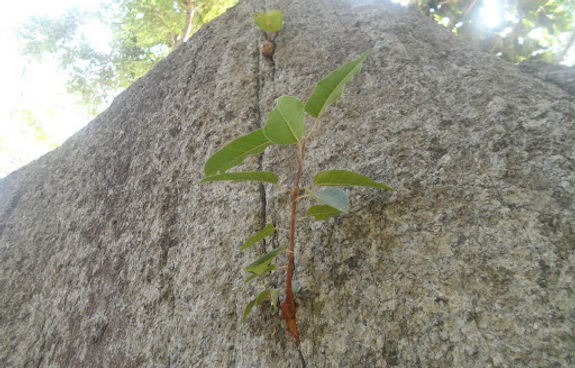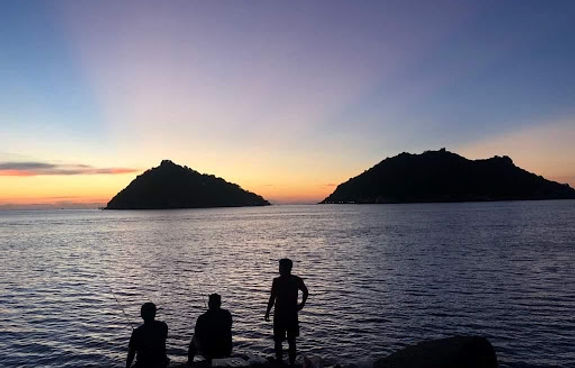Sueños varados: Las experiencias de los migrantes birmanos en el sector turístico tailandés, entre la pandemia y el golpe de estado militar
SOFIE MORTENSEN | 21 FEBRERO 2022 | ROUTED Nº19 | TRADUCIDO DEL INGLÉS POR

Photo by Min. ‘This previously popular place has now become silent.’ Title: Lonely Ghost City/အထီးကျန်တစ္ဆေမြို့
It is early January 2022, and this is my third visit to Koh Tao, Thailand since last year. I am driving around the island with my good friend Phyo Oo when he blurts out: ‘You know, Sofie, I have lost my dream.’ During the past two years, he and the fifty other Myanmar workers I have interviewed have dealt not only with the devastating economic impacts of COVID-19 but also the military coup. For the vast majority, their dream and purpose of being in Thailand to buy land, construct a house, and return to their families are now on hold. At the same time, they are mostly unable to send back money. In May 2021, Maung Lin told me, ‘I am worried about my family in Myanmar. We cannot call each other. I do not know what is going on right now in my home, and I also cannot support them financially. As you know, we have no job here.’ The double pressure of COVID-19 and the situation in Myanmar causes immense distress. After a short hopeful break, their country is again back on the long road of dictatorship and, in anger and frustration, they follow the increasing conflict and grave human rights violations closely. Moe Khaing expressed her despair about the situation: ‘I have lost my dream, and I think I am not alone. It is all people in Myanmar. Now, our life is meaningless; we do not have enough work here, and we cannot return. We are kind of nothing. Useless.’ Yet, despite their own challenges, many donate what they can to the resistance movement, and collect clothes to send to refugees on the border.
While Thailand is known for its good food and kind and accommodating people, Burmese women and men cook and serve the Phad Thai tourists order in popular destinations such as the famous scuba diving island of Koh Tao. Indeed, not only Thais and foreign owners feel the impacts of COVID-19, but also the many Myanmar workers that put a friendly face to ‘The Land of Smiles.’ Of the previously 8,000 Myanmar workers on Koh Tao, 7,000 have had to find jobs elsewhere. Those who remain suffer the consequences of un- and underemployment, and some work the same hours for much lower salaries. Tun Min works the same nine hours but has had his pay cut in half to 7,500 Thai baht a month (230 USD). His wife lost her job, and he laments: ‘We have forgotten about our plans to save up and only think about day-to-day survival now’. Aye Aye shares a similar experience and works twelve hours a day for 5,000 baht a month (150 USD). Others like Than Win have had both their salary and hours cut: ‘During COVID, I only work 15 days and get only between 2,000 and 3,000 baht’. There are many such examples, and for some, the pay is lower than the 325 baht (10 USD) daily minimum wage. Labour rights violations are not new, even in a remunerative sector for migrant workers, compounded by the high cost of living on Koh Tao, and the expensive visas and work permits that Myanmar workers often pay for themselves to get jobs. Nevertheless, violations have increased during the pandemic, and consequently, life in Koh Tao has become precisely what they tried to escape in Myanmar: day-to-day survival.

Photo by Bob. Title: Life is war/ ဘဝတိုက်ပွဲ
While the current economic and political situation significantly constrains the agency of the Myanmar people in Koh Tao, they find strategies to cope. As Bob poetically describes, they are like the plant in the photo; they need to grow within a small line under difficult conditions, without water and soil, but they stay strong and survive with what they have. Some use their savings to get through COVID-19, and others rely on loans or help to stay fed. Others collect forest products or fish, which, as Ni Ni documented, has been permitted close to shore during COVID. Some families are forced to physically part in search of work, like Phyu’s husband, who left for the mainland after a year of unemployment. She says this is the first time they have ever been apart, and it breaks her heart.

Photo by Nini. Men are fishing from the shore. Title: Trying to survive during COVID-19 / ကာလအတွင်း ကြိုးစားသက်ရှင်နေထိုင်ကြသူများ
Undeniably, the emotional toll of the situation is serious, and the dwindling of savings prolongs the pain of life away from family. May told me, ‘I want to go back to Myanmar because I miss my daughter. But I need to work first to save money to buy land or a house.’ Some would even prefer to return now, despite the political situation. Twenty-two-year-old Phyo Oo explains: ‘Actually, I want to go back to Myanmar. I miss it. I miss my childhood friends, my mom and my grandma. I still think about going back, even now.’ However, the dream of better lives for their families and themselves has not yet dawned, so they stay. As Nyi Nyi Min describes with his sunset photo: ‘The sun goes up and down, and I am still waiting for the day to go home’.

Photo by Nyi Nyi Min. Title: Missing home/ အိမ်လွမ်းတယ်.
After spending several months with Myanmar people on Koh Tao, it is hard not to admire their strength in this impossible situation. Yet, it also shows the extent of abandonment of the migrant workers who sustain Thailand’s tourism industry. While the Thai borders increasingly reopen and tourists regain their mobility, Myanmar workers are not so lucky. For them, this mobility walks hand in hand with a new form of immobility that stems not only from tightened borders and conflict but also the continuous loss of financial means. This, as we witness in their stories, highlights the need for a new normal that ensures labour rights and takes into account how these harsh conditions, exacerbated by COVID-19, contribute to making otherwise mobile persons immobile, and with that prolong the emotional cost of migration.
Acknowledgements: This project has received funding from the European Union’s Horizon 2020 research and innovation programme, under the Marie Skłodowska-Curie grant agreement No 801199. The fieldwork was supported by Torben og Alice Frimodts Fond, Knud Højgaards Fond and Christian og Ottilia Brorsons Rejselegat.

Sofie Mortensen
Sofie Mortensen is a PhD student at Copenhagen University, Department for Food and Resource Economics. She focuses on the gendered and generational experiences of Burmese migrants in the Thai tourism and agriculture sectors. She is also interested in the connections between agrarian change and migration, as well as migrant workers’ dreams for the future. Get in touch: somo@ifro.ku.dk







%20Helen%20Dempster%20image1.jpg)